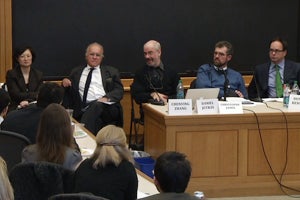The following story, by Juliet R. Bailin, originally appeared in the Jan. 28 edition of The Harvard Crimson.
Deans representing law schools in China, Brazil, Canada, and France gathered at Harvard Law School on Friday to discuss the pressures facing law schools to reform curricula in response to globalization.
The deans also focused on how the changing relationship between common and civil law will figure into the future of legal education.
According to Christophe Jamin, Dean of the Sciences Po Law School in France, there have been no official changes in the way law is taught in France. But certain trends have emerged in legal education—more students than ever before are pursuing double degrees at multiple European law schools and within their own university.
“The members of the bar seem to be very happy with the way we teach law in France,” Jamin said. “The pressure comes from in-house counsels [of corporations]. Globalization is very important for them…They want students to be able to speak with someone in China in the morning and with South Africa in the evening.”
A number of the deans said that they are concentrating on integrating common and civil law education—two areas of law that are historically distinct but are currently being reevaluated as law schools attempt to bring their curricula into the 21st century.
For example, Daniel Jutras, Dean of Law at McGill University, said that McGill has created a program to integrate civil and common law, but not as a response to the pressures of globalization. Rather, McGill recognized the need to reform its curriculum to reflect political and cultural transformations in Canada that were contributing to the decline of applications from Anglophone students.
McGill is a primarily English-speaking institution located within the French minority province of Quebec.
“This is really what any law school should do—define oneself and one’s program in ways that make sense internally, not in global positioning of laws schools,” Jutras said.
Jutras added that he has noticed that other schools are reforming curricula as a marketing device, a way to raise money, or to respond to pressures from segments of the Bar Association.
Harvard Law School Professor David B. Wilkins questioned whether one of the pressures to reform curricula is stemming from the Americanization of legal education and lawyering on a global scale. … Read the full story on The Harvard Crimson website »
For more information, visit the Harvard Law School S.J.D. Association website.
